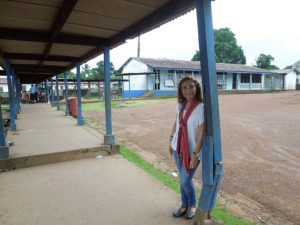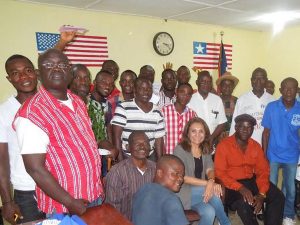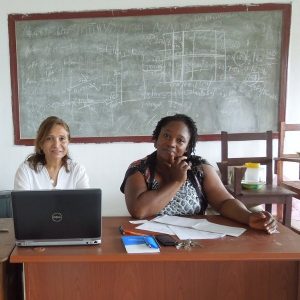-
What We Do
- WHERE WE WORK
-
About Us
 Welcome Message from Carol Jenkins
Welcome Message from Carol JenkinsFor more than 90 years, World Learning has equipped individuals and institutions to address the world’s most pressing problems. We believe that, working together with our partners, we can change this world for the better.
On my travels, I’ve had the opportunity to meet with many of those who have joined us in this mission. In Baghdad, we’ve trained more than 2,300 Iraqi youth who are already giving back at home. In London, our partners in the TAAP Initiative strongly believe that we are all responsible to practice inclusion. And in Vermont, our Experiment in International Living and School for International Training participants prove every day that they have the tools and the determination to change the world.
Please join us in our pursuit of a more peaceful and just world.
- Get Involved
Media Center > Story
Boosting Community College
May 2, 2018
When Ana Gil-Garcia arrived in Buchanan, a rural area more than two hours from the Liberian capital of Monrovia, she was committed to assisting teachers at Grand Bassa Community College (GBCC) to improve standards in the classroom.

As the largest public community college in the country, GBCC educates many of the country’s nurses, agriculture specialists, teacher’s aides, business associates, and community organizers. As a public institution, Gil-Garcia believes it has a vital role. “It is a solution to the future of Liberia,” she explains.
GBCC decided that the first task would be for Gil-Garcia to support standardizing course syllabi across departments. “They realized they needed to orchestrate better. The syllabus needed a standard structure even though the content would be different. We went over every element that has to be included in a syllabus,” she explains.
In addition to curriculum design, Gil-Garcia, who is a tenured professor of education at Northeastern Illinois University, spent approximately 30 hours training teachers in instructional methodology and student assessment. She wanted the teachers to see that proper evaluation is not just about grading tests. So she introduced college instructors of four departments — nursing, teacher education, agriculture and business management — to other ways to assess students, such as projects, demonstrations, and presentations.
“They were attached to the traditional methods but by the end of the week they were open to introducing a little bit of change in the way they approach instruction,” she says.

As the founder of The Book Partnership, an international service project bringing books and instructional materials to socioeconomically deprived schools worldwide, Gil-Garcia, also a published author and esteemed community leader, collected books from her college in Chicago to donate to the GBCC library. In total, she donated 70 books on topics including education administration, teaching, classroom assessment, and human resources.
Born in Venezuela, Gil-Garcia has been the recipient of many accolades for her work in higher education, including four Faculty Excellence Awards for teaching, research and service as well as the Hispanic Faculty Excellence Education Award. In 2010 she was recognized as one of the 100 Most Influential Hispanics in the U.S. by Hispanic Business magazine. She remains an advocate for Latino educators and has worked tirelessly to support public education in Chicago.
In addition, Gil-Garcia has vast international experience, having trained teachers in Saudi Arabia, Armenia, Georgia, Panama, Qatar, and Egypt and says her Fulbright experience in Liberia taught her much about resilience and teaching as she observed a lack of resources, sporadic electricity and water, and at times, excessive flooding of unpaved roads. “I never felt that I was teaching; I always thought that I was learning,” she says.
 At the end of her Fulbright Specialist grant, Gil-Garcia met four Liberian women who had recently returned to the country after years in the U.S. to escape Liberia’s civil war. Now back home, they are eager to establish a teacher training center that could be a model for West African countries. Gil-Garcia hopes to work with them and is exploring potential opportunities.
At the end of her Fulbright Specialist grant, Gil-Garcia met four Liberian women who had recently returned to the country after years in the U.S. to escape Liberia’s civil war. Now back home, they are eager to establish a teacher training center that could be a model for West African countries. Gil-Garcia hopes to work with them and is exploring potential opportunities.
The goal is to ensure more women enter the teaching profession in Liberia. “There are some female students, but they don’t see female faculty on campus,” she says, recalling how surprised she was to see so few women teachers anywhere in the country.
She believes it’s important to change that.
“These faculty are teaching future teachers of Liberia,” says Gil-Garcia. “The country’s future depends on them.”
Given the importance of GBCC to Liberia, Gil-Garcia has since met with the Chancellor of the City Colleges of Chicago and discussed potential collaboration with GBCC. She is working on a plan to go back.
The Fulbright Specialist Program was established in 2001 by the U.S. Department of State and the Bureau of Educational and Cultural Affairs (ECA) to enable U.S. professionals and scholars to work on short-term projects overseas in conjunction with local host institutions.
For more information about the Fulbright Specialist Program or to apply, please go to: https://fulbrightspecialist.worldlearning.org/the-fulbright-specialist-program/





